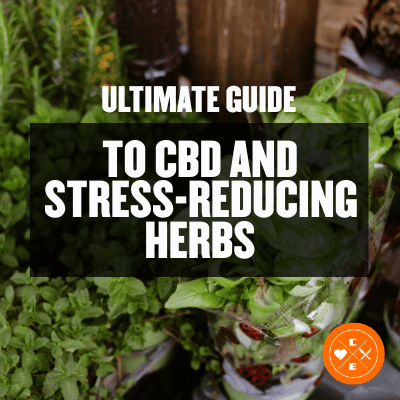Ultimate Guide to CBD and Stress-Reducing Herbs

Jason Nista
Nutrition
|
Healthy Lifestyle
10/08/2025 9:02am
16 minute read
CBD and stress-relieving herbs like ashwagandha, chamomile, and lemon balm can work together to help reduce stress, improve sleep, and promote relaxation. CBD interacts with the body’s endocannabinoid system to manage stress, while herbs provide additional calming or mood-stabilizing effects. Here’s a quick breakdown of how to use them:
- Top Herbs to Pair with CBD:
- Ashwagandha: Helps regulate cortisol for stress relief.
- Chamomile & Lavender: Promotes relaxation and better sleep.
- Lemon Balm & Holy Basil: Improves mood and mental clarity.
- Valerian Root & Passionflower: Calms the mind, ideal for sleep.
- Reishi Mushroom & Turmeric: Supports overall balance and reduces inflammation.
- Best Ways to Use:
- Tinctures & Oils: Quick absorption for immediate relief.
- Teas & Infusions: A soothing ritual for relaxation.
- Capsules: Convenient, long-lasting effects for ongoing support.
- Key Considerations:
- Start with small doses and monitor your body’s response.
- Be mindful of interactions with medications.
- Look for third-party tested products for quality assurance.
Combining CBD with herbs can support stress management, but consistency and proper nutrition are essential for the best results. Pair these remedies with a healthy lifestyle for optimal benefits.
SLEEP SUPPORT - Review of CBD Herbal BLEND by COEUR ORGANICS
Top Stress-Reducing Herbs to Use with CBD
Pairing herbs with CBD can create a well-rounded approach to managing stress and anxiety. Each herb brings its own benefits, complementing CBD to support relaxation and emotional balance. Here's a closer look at some popular options.
Ashwagandha
Ashwagandha is often praised for its ability to help the body adapt to stress. It’s known to support cortisol levels, promoting a sense of calm while aiding in overall stress regulation. When combined with CBD, ashwagandha can enhance relaxation and provide steady support during challenging times.
Chamomile and Lavender
Chamomile is a classic choice for relaxation, often enjoyed as a soothing tea to ease tension. Lavender, on the other hand, is popular for its calming aroma, whether used in essential oils, baths, or diffusers. Together with CBD, these herbs can amplify feelings of tranquility and help create a peaceful environment.
Lemon Balm and Holy Basil
Lemon balm is known for its uplifting properties, while holy basil is celebrated for supporting mental clarity. When paired with CBD, these herbs can help stabilize mood and promote emotional balance. Lemon balm works well in teas, while holy basil extracts can be easily included in daily wellness routines.
Valerian Root and Passionflower
Valerian root is often used in the evening to calm an overactive mind, making it a go-to for unwinding after a long day. Passionflower, known for its gentle calming effects, can complement CBD by helping to quiet racing thoughts. Together, they provide a natural way to ease into a state of relaxation.
Reishi Mushroom and Turmeric
Reishi mushroom and turmeric tackle stress from a different angle by addressing inflammation in the body. Reishi is valued for its role in promoting overall balance and wellbeing, while turmeric, rich in curcumin, is known for its anti-inflammatory properties. When combined with CBD, these botanicals can contribute to a holistic approach to stress management, supporting both mind and body.
Best Ways to Use CBD-Herb Combinations
Combining CBD with herbs can enhance their benefits, and the method you choose can influence how quickly and effectively you experience results. Here are some of the most popular ways to use these combinations, each offering unique advantages based on your needs.
Tinctures and Oils
Sublingual tinctures are one of the quickest ways to feel the effects of CBD-herb blends. By placing a few drops under your tongue and holding them there for 30-60 seconds, the compounds bypass digestion and are absorbed directly into your bloodstream. This method typically works within 15-30 minutes, making it a great option for sudden stress or tension.
Many tinctures pair CBD with herbal extracts like ashwagandha or lemon balm. These are often mixed with an alcohol or MCT oil base, which helps retain the potency of the active ingredients and ensures consistent dosing. Start small - usually 1-2 drops - and gradually adjust until you find the amount that works best for you. Keep track of your dosage to tailor it to your needs.
Topical oils, on the other hand, are designed for localized relief. When applied to areas like the temples, neck, or shoulders, they can ease physical tension while promoting relaxation. These oils often include soothing herbs like lavender or chamomile, complementing the CBD for a calming effect. Plus, the act of massaging the oil into your skin can be a mindful practice that enhances the overall experience.
Looking for something more ritualistic? CBD-infused herbal teas might be the way to go.
Teas and Infusions
CBD-infused herbal teas combine relaxation with the comforting ritual of brewing and sipping. The warmth of the tea itself is soothing, while blends like chamomile-CBD are perfect for winding down in the evening, and holy basil-CBD mixes can help maintain balance during the day.
When preparing these teas, temperature matters. Avoid boiling water, as excessive heat can break down both CBD and delicate herbal compounds. Instead, aim for water heated to 175-185°F and steep the tea for 5-7 minutes to extract the full range of benefits.
For convenience, you can opt for pre-made CBD tea bags, but loose-leaf blends often offer more flexibility and potency. You can customize your tea by adjusting the steeping time or adding extra herbs like turmeric or a few drops of lemon balm tincture.
Timing your tea can also make a difference. Morning blends with energizing herbs like holy basil can set a calm yet focused tone for the day, while evening blends with chamomile or passionflower are ideal for preparing your body and mind for sleep. Drinking your tea 30-60 minutes before bed can help ease you into a restful state.
For a more structured approach, capsules and supplements provide a straightforward option.
Capsules and Supplements
Capsules offer a convenient, pre-measured way to take CBD-herb combinations, especially if you prefer to avoid the taste of tinctures or teas. These supplements often pair CBD with standardized herbal extracts to ensure consistent benefits with every dose.
Delayed-release capsules are ideal for prolonged effects. While they take longer to kick in - typically 45-90 minutes - they provide steady relief for 4-6 hours, making them a great option for managing chronic stress or maintaining calm throughout a busy day. Depending on your needs, you can take them once or twice daily.
When selecting capsules, look for products that clearly state the milligrams of CBD and the percentages of herbal extracts. Lab-tested formulations ensure quality and reliability. Some capsules combine multiple herbs, such as ashwagandha, reishi, and turmeric, along with CBD, for a well-rounded approach to stress management.
Soft gel capsules may offer better absorption compared to hard capsules. Since the CBD and herbs are suspended in oil rather than powder, they are often easier for the body to process, resulting in more consistent effects over time.
Each method has its strengths, so choose the one that fits your lifestyle and goals. Whether you prefer the immediacy of tinctures, the comforting ritual of tea, or the simplicity of capsules, there’s a CBD-herb combination to suit your needs.
sbb-itb-1989a25
Benefits and Considerations of CBD-Herb Blends
Following the earlier discussion on practical uses and herb profiles, this section dives into the advantages and potential risks of CBD-herb blends. Knowing both sides can help ensure safe and effective use.
Benefits of Combining CBD and Herbs
Pairing CBD with herbs can create a powerful synergy, often referred to as the entourage effect. This occurs when compounds work together to amplify each other’s therapeutic effects, offering a more well-rounded approach to wellness.
- Enhanced stress response: CBD helps regulate the endocannabinoid system, while herbs like ashwagandha manage cortisol levels. Together, they tackle stress through multiple biological pathways.
- Better sleep quality: Chamomile’s apigenin and CBD’s impact on GABA work in tandem to calm racing thoughts and relax the body, making it easier to fall and stay asleep.
- Long-lasting effects: CBD provides relief for 4–6 hours, while adaptogens like reishi mushroom build resilience over time with consistent use.
- Reduced inflammation: CBD’s anti-inflammatory properties pair well with herbs like turmeric, addressing stress-related inflammation more effectively.
- Improved mood stability: CBD’s interaction with serotonin receptors complements holy basil’s ability to balance cortisol, promoting steady moods throughout the day.
While these benefits are promising, it’s important to approach CBD-herb blends with care, as individual responses and safety considerations vary.
Potential Limitations and Safety
CBD-herb combinations are not suitable for everyone, and there are several factors to keep in mind:
- Medication interactions: CBD can interfere with liver enzymes responsible for metabolizing certain medications, potentially affecting their efficacy. Herbs like turmeric may amplify this effect, while valerian root could heighten the sedative effects of sleep aids.
- Individual sensitivity: Responses to blends differ widely. For example, what energizes one person might make another feel drowsy. Starting with small doses and observing your body’s reaction is key.
- Product quality: The lack of standardized regulations in the CBD industry means some products may not meet quality standards. Look for third-party tested options to ensure safety.
- Timing challenges: Some combinations may not suit every time of day. For example, valerian root can be too sedating for daytime, while holy basil might disrupt sleep if taken too late.
- Cumulative effects: Adaptogenic herbs build up in the body over time, meaning effective doses may need adjustment as your system adapts.
- Legal and workplace concerns: CBD can sometimes show up on drug tests, and certain herbs may interact with substances monitored in workplace screenings.
Comparison Table
| Herb Combination | Primary Benefits | Best Use Cases | Potential Drawbacks |
|---|---|---|---|
| CBD + Ashwagandha | Supports cortisol balance, boosts energy | Managing chronic stress, daily routines | May upset the stomach, could interact with thyroid meds |
| CBD + Chamomile | Promotes restful sleep, soothes digestion | Evening relaxation, mild anxiety | May cause drowsiness or allergic reactions (ragweed sensitivity) |
| CBD + Lavender | Eases tension, uplifts mood | Acute stress, headaches, pre-sleep rituals | Strong scent might be overwhelming, potential skin irritation in topical use |
| CBD + Lemon Balm | Improves mental clarity, calms the mind | Daytime stress, focus, mild depression | May lower blood pressure, could interact with sedatives |
| CBD + Holy Basil | Stabilizes mood, supports cognition | Stress relief, emotional balance | May affect blood sugar, interacts with diabetes medications |
| CBD + Valerian Root | Deep sleep aid, muscle relaxation | Severe insomnia, physical tension | Strong sedative effects, morning grogginess, potential liver concerns with long-term use |
| CBD + Passionflower | Calms the nervous system, reduces anxiety | Social anxiety, restlessness, mild sleep issues | May cause dizziness or confusion, enhances sedative effects |
| CBD + Reishi | Boosts immunity, builds resilience | Chronic fatigue, immune support | Slow to take effect, may cause digestive upset, interacts with blood thinners |
| CBD + Turmeric | Combats inflammation, relieves pain | Joint discomfort, physical stress | Potential stomach irritation, blood-thinning effects, may stain teeth or clothing |
Your personal response to these blends is key. Incorporating them into a routine that includes proper nutrition, regular exercise, and good sleep habits can maximize their benefits.
Adding CBD and Herbs to Your Stress-Relief Routine
Building an effective CBD and herb routine for stress relief requires thoughtful planning and consistency. By aligning specific CBD-herb combinations with your daily schedule, supporting their effects with proper nutrition, and staying informed about legal guidelines, you can create a well-rounded approach to managing stress.
Daily Routines and Timing
Incorporating CBD and herbs into your day works best when matched to your natural rhythm. For morning routines, blends like CBD with ashwagandha or holy basil are ideal. These combinations help regulate cortisol levels without making you feel drowsy, making them perfect for a start between 7:00 AM and 9:00 AM.
During midday, a mix of CBD and lemon balm can provide mental clarity and calmness without sedation. This blend is great for managing stress during lunch breaks and works best when taken between 12:00 PM and 2:00 PM.
For evening relaxation, calming blends like CBD with chamomile, lavender, or valerian root are excellent choices. These are best taken 1–2 hours before bedtime to help you unwind. If you’re using valerian root, aim for around 8:00 PM to avoid morning grogginess if you plan to sleep by 10:00 PM.
Consistency is crucial for adaptogenic herbs like ashwagandha and reishi mushroom, as their effects typically build over 2 to 4 weeks of regular use. Start with smaller doses and gradually increase as needed. For better absorption, take CBD with a small amount of fat, such as avocado or nuts.
Pairing your CBD-herb routine with balanced nutrition can further enhance its benefits.
Pairing with Balanced Nutrition
The right nutrition can amplify the calming and stress-relieving properties of CBD and herbs by supporting neurotransmitter production and overall health.
- Magnesium-rich foods like leafy greens, nuts, and seeds can enhance the soothing effects of CBD and herbs like chamomile.
- B-vitamins from whole grains and lean proteins help maintain adrenal health, which supports the effectiveness of adaptogens like ashwagandha.
- Omega-3 fatty acids from fish, flax seeds, and walnuts can strengthen the endocannabinoid system, potentially increasing CBD’s efficacy while offering anti-inflammatory benefits that complement herbs like turmeric.
Maintaining steady blood sugar levels is equally important. Balanced meals with adequate protein, complex carbohydrates, and healthy fats provide sustained energy and help prevent cortisol spikes caused by blood sugar fluctuations.
For convenience, services like Clean Eatz Kitchen offer chef-prepared, nutrient-dense meals that simplify meal planning. Their high-protein, portion-controlled options can provide the nutritional foundation needed for CBD and herbs to work effectively, without adding the stress of meal prep.
Hydration is another key factor. Dehydration can raise cortisol levels and diminish the benefits of your CBD-herb routine. Aim to drink about half your body weight in ounces of water daily. Herbal teas can also be a great addition to your hydration plan.
To get the most out of your routine, align meal timing with your CBD-herb intake. For example, fat-soluble compounds like ashwagandha are often more effective when taken about 30 minutes before a meal.
As you refine your routine, it’s important to stay informed about legal and social considerations.
Legal and Cultural Considerations
Understanding the legal and cultural landscape surrounding CBD and herbs is essential for confident use. The 2018 Farm Bill federally legalized hemp-derived CBD with less than 0.3% THC, but state laws can vary widely.
Even in states where CBD is legal, workplace policies may impose restrictions, particularly in industries like healthcare or transportation. Some companies enforce zero-tolerance policies, and CBD use could result in a positive drug test. Always review your employer’s guidelines before starting a CBD routine.
When traveling, it’s a good idea to carry CBD products in their original packaging along with a Certificate of Analysis (COA) to avoid potential issues.
Cultural acceptance of CBD and herbal remedies also varies across the U.S. Urban areas and states with established cannabis programs tend to offer more acceptance and easier access to products. In rural areas, while CBD options may be fewer, traditional herbal remedies are often embraced.
Since the FDA has limited oversight of CBD products, prioritize brands that offer third-party testing, COAs, and GMP certification to ensure quality and safety.
CBD and herbal remedies have become mainstream, and many wellness forums and local groups provide support and advice for those exploring these options. Professional guidance is also valuable, especially if you’re combining multiple supplements or have underlying health issues. Naturopathic doctors, integrative medicine specialists, and even some primary care physicians can offer tailored recommendations for your needs.
Conclusion
Blending CBD with stress-relieving herbs can be a powerful way to tackle daily stress and boost overall well-being. In this guide, we’ve looked at how herbs like ashwagandha, chamomile, lemon balm, and valerian root complement CBD to promote relaxation, improve sleep, and support your body’s ability to handle stress.
For the best results, consistency is key. Whether you prefer tinctures, teas, or capsules, choose delivery methods that fit seamlessly into your lifestyle. Keep in mind that adaptogenic herbs often take time to deliver noticeable effects, so patience is essential. Start with small doses, be mindful of potential interactions with medications, and consult a healthcare provider to ensure safety.
Pairing your CBD-herb routine with a nutrient-rich diet can amplify the benefits. Eating wholesome, nutrient-dense foods supports both your physical and mental health, creating a solid foundation for stress management. This holistic approach ties together natural remedies and healthy eating for a comprehensive wellness plan.
As you incorporate these strategies, pay close attention to how your body responds. Adjust your routine based on your unique needs, tracking factors like energy levels, sleep quality, and mood. Experiment with timing and dosage to find the combination that works best for you.
Finally, stay updated on new research and regulations to refine your approach over time. With high-quality products and a steady routine, you can create a sustainable plan for reducing stress and supporting long-term wellness.
FAQs
What’s the best way to figure out the right CBD and herb dosage for stress relief?
Finding the right balance of CBD and stress-relieving herbs is a journey unique to each individual. A good starting point is to begin with a low dose of CBD and slowly increase it, paying close attention to how your body reacts. A general rule of thumb for CBD is 1–6 mg per 10 pounds of body weight. Daily doses can vary widely, often falling anywhere between 10 and 900 mg, depending on personal needs and goals.
If you're combining herbs with CBD, it’s essential to think about how these might interact. Seeking advice from a healthcare professional can help you determine the best approach and ensure you're using the right amounts to support your stress management routine effectively.
Can CBD and stress-relieving herbs interact with medications or health conditions?
CBD and some stress-relieving herbs can interact with various medications, including blood thinners, antidepressants, anti-epileptic drugs, opioids, and antipsychotics. These interactions might change how the medications function or heighten the likelihood of side effects.
It's also important to note that CBD and certain herbs might not be safe for those who are pregnant, breastfeeding, or dealing with specific health conditions. To stay on the safe side, always check with a healthcare professional before using CBD or combining it with other herbs or medications.
What legal factors should I consider before using CBD and stress-relieving herbs?
In the United States, hemp-derived CBD is federally legal as long as it contains less than 0.3% THC. However, state laws can differ significantly. Some states impose stricter rules or even ban its use altogether. That’s why it’s crucial to review your local regulations before buying or using any CBD products.
It’s also worth noting that the FDA has not approved CBD as a dietary supplement or a medical treatment. This means companies are not allowed to market CBD products with claims about health benefits. While the 2018 Farm Bill legalized hemp-derived CBD, the DEA still classifies it as a Schedule I substance, which adds some complexity to its legal status.
To stay informed and safe, take the time to understand your state’s specific laws. If you’re considering using CBD, especially in combination with herbs for stress relief, consulting a healthcare professional is always a smart move.
Related Articles
Best Portion-Controlled Meal Delivery Services in 2025
12 minute read
Top 7 Foods for Glycogen Recovery
26 minute read
Top 5 Carb Loading Snacks for Race Day
16 minute read



